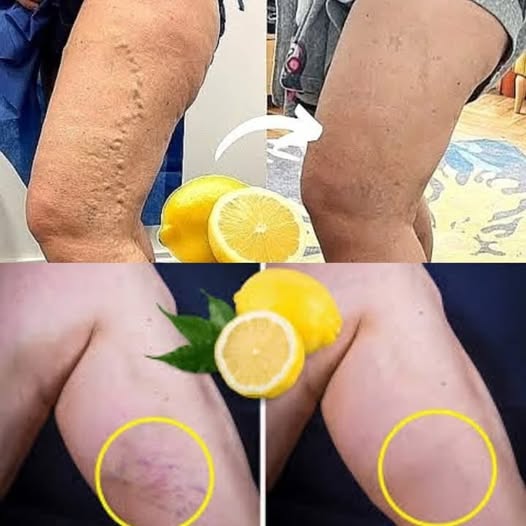Below is an overview of how lemon is sometimes associated with varicose vein relief, what it can realistically offer, and how it fits into a broader approach to managing this common issue. While some home remedies use lemon as part of their routine, it’s crucial to maintain realistic expectations and understand that varicose veins often require more comprehensive approaches.
Varicose Veins: A Brief Overview
What They Are:
Varicose veins are enlarged, twisted veins that typically appear in the legs due to weakened valves and compromised circulation. They can cause discomfort, swelling, and cosmetic concerns.
Common Causes and Risk Factors:
- Genetics and family history
- Occupations that involve prolonged standing or sitting
- Pregnancy and hormonal changes
- Age, weight, and lifestyle factors
When to Seek Professional Help:
If varicose veins lead to significant pain, skin changes, or a reduced quality of life, it’s essential to consult a healthcare professional. Treatments may include compression stockings, sclerotherapy, laser therapy, or, in advanced cases, surgery.
The Potential Role of Lemon
Lemon’s Nutritional Profile:
- Vitamin C: Lemons are a good source of this antioxidant, supporting collagen production and potentially aiding in maintaining strong blood vessel walls.
- Antioxidants and Flavonoids: Compounds in lemons may help combat oxidative stress, which can contribute to vascular issues.
Topical Uses:
- Some home remedies suggest using diluted lemon essential oil or lemon-infused treatments on the skin. The idea is that the astringent properties might temporarily improve tone in superficial vessels or provide a refreshing, cooling sensation.
- It’s important to note that topical application of lemon juice or oil can cause skin irritation, especially if applied directly and exposed to sunlight (risk of photosensitivity).
Ingesting Lemon:
- Adding lemon juice to water and drinking it regularly offers a mild boost of vitamin C and antioxidants. While this won’t reverse varicose veins, it may support overall vascular health as part of a balanced diet.
- Consider this as a complement to other healthy habits rather than a standalone solution.
Limitations and Realistic Expectations
- No Direct Cure:
There is no solid evidence that lemon—topically or orally—can cure or significantly reduce varicose veins. - Mild Supportive Role:
At best, lemon may offer supportive benefits: providing antioxidants, minor circulation support, and temporary comfort, particularly when included in an overall healthy lifestyle. - Complementary, Not Curative:
Lemon should be viewed as a supplementary measure. Lifestyle changes such as regular exercise, maintaining a healthy weight, avoiding prolonged standing or sitting, and using compression stockings may yield more noticeable improvements.
Safer and More Effective Alternatives
Medical Interventions:
- Compression Stockings: Help improve circulation and reduce discomfort.
- Sclerotherapy or Laser Treatments: Minimally invasive procedures can diminish the appearance and discomfort of varicose veins.
- Surgical Options: In severe cases, surgical procedures may be advised by a vascular specialist.
Lifestyle Approaches:
- Exercise: Regular activities like walking, swimming, or cycling improve circulation.
- Elevating Legs: Reduces pressure on veins and relieves symptoms.
- Balanced Diet: Rich in fruits, vegetables, and fiber supports overall cardiovascular health.
Bottom Line
While lemons contain antioxidants and vitamin C that support overall vascular health, there’s no scientific evidence that they can directly address or reverse varicose veins in a meaningful way. Applying lemon juice or essential oil topically is unlikely to have a significant impact beyond mild, short-lived comfort.
For tangible, lasting relief, it’s best to rely on medically vetted treatments and lifestyle adjustments. If varicose veins are causing discomfort or cosmetic concerns, consult a healthcare professional to explore appropriate options. Lemons can remain a part of your wellness routine—just don’t expect them to be a standalone solution for varicose veins.
